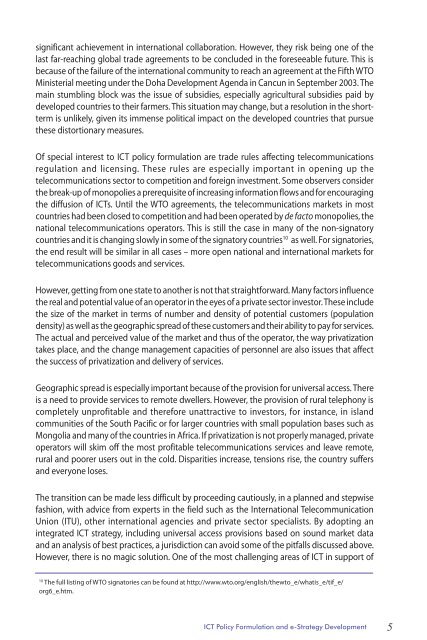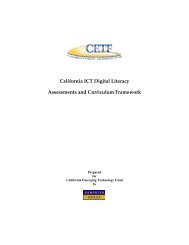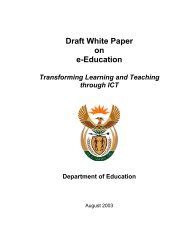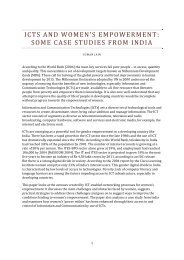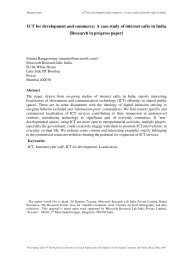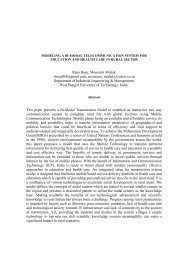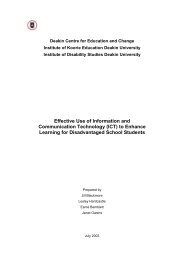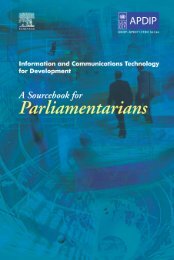ICT Policy Formulation and e-Strategy Development: A ... - un-apcict
ICT Policy Formulation and e-Strategy Development: A ... - un-apcict
ICT Policy Formulation and e-Strategy Development: A ... - un-apcict
You also want an ePaper? Increase the reach of your titles
YUMPU automatically turns print PDFs into web optimized ePapers that Google loves.
significant achievement in international collaboration. However, they risk being one of the<br />
last far-reaching global trade agreements to be concluded in the foreseeable future. This is<br />
because of the failure of the international comm<strong>un</strong>ity to reach an agreement at the Fifth WTO<br />
Ministerial meeting <strong>un</strong>der the Doha <strong>Development</strong> Agenda in Canc<strong>un</strong> in September 2003. The<br />
main stumbling block was the issue of subsidies, especially agricultural subsidies paid by<br />
developed co<strong>un</strong>tries to their farmers. This situation may change, but a resolution in the shortterm<br />
is <strong>un</strong>likely, given its immense political impact on the developed co<strong>un</strong>tries that pursue<br />
these distortionary measures.<br />
Of special interest to <strong>ICT</strong> policy formulation are trade rules affecting telecomm<strong>un</strong>ications<br />
regulation <strong>and</strong> licensing. These rules are especially important in opening up the<br />
telecomm<strong>un</strong>ications sector to competition <strong>and</strong> foreign investment. Some observers consider<br />
the break-up of monopolies a prerequisite of increasing information flows <strong>and</strong> for encouraging<br />
the diffusion of <strong>ICT</strong>s. Until the WTO agreements, the telecomm<strong>un</strong>ications markets in most<br />
co<strong>un</strong>tries had been closed to competition <strong>and</strong> had been operated by de facto monopolies, the<br />
national telecomm<strong>un</strong>ications operators. This is still the case in many of the non-signatory<br />
co<strong>un</strong>tries <strong>and</strong> it is changing slowly in some of the signatory co<strong>un</strong>tries 10 as well. For signatories,<br />
the end result will be similar in all cases – more open national <strong>and</strong> international markets for<br />
telecomm<strong>un</strong>ications goods <strong>and</strong> services.<br />
However, getting from one state to another is not that straightforward. Many factors influence<br />
the real <strong>and</strong> potential value of an operator in the eyes of a private sector investor. These include<br />
the size of the market in terms of number <strong>and</strong> density of potential customers (population<br />
density) as well as the geographic spread of these customers <strong>and</strong> their ability to pay for services.<br />
The actual <strong>and</strong> perceived value of the market <strong>and</strong> thus of the operator, the way privatization<br />
takes place, <strong>and</strong> the change management capacities of personnel are also issues that affect<br />
the success of privatization <strong>and</strong> delivery of services.<br />
Geographic spread is especially important because of the provision for <strong>un</strong>iversal access. There<br />
is a need to provide services to remote dwellers. However, the provision of rural telephony is<br />
completely <strong>un</strong>profitable <strong>and</strong> therefore <strong>un</strong>attractive to investors, for instance, in isl<strong>and</strong><br />
comm<strong>un</strong>ities of the South Pacific or for larger co<strong>un</strong>tries with small population bases such as<br />
Mongolia <strong>and</strong> many of the co<strong>un</strong>tries in Africa. If privatization is not properly managed, private<br />
operators will skim off the most profitable telecomm<strong>un</strong>ications services <strong>and</strong> leave remote,<br />
rural <strong>and</strong> poorer users out in the cold. Disparities increase, tensions rise, the co<strong>un</strong>try suffers<br />
<strong>and</strong> everyone loses.<br />
The transition can be made less difficult by proceeding cautiously, in a planned <strong>and</strong> stepwise<br />
fashion, with advice from experts in the field such as the International Telecomm<strong>un</strong>ication<br />
Union (ITU), other international agencies <strong>and</strong> private sector specialists. By adopting an<br />
integrated <strong>ICT</strong> strategy, including <strong>un</strong>iversal access provisions based on so<strong>un</strong>d market data<br />
<strong>and</strong> an analysis of best practices, a jurisdiction can avoid some of the pitfalls discussed above.<br />
However, there is no magic solution. One of the most challenging areas of <strong>ICT</strong> in support of<br />
10<br />
The full listing of WTO signatories can be fo<strong>un</strong>d at http://www.wto.org/english/thewto_e/whatis_e/tif_e/<br />
org6_e.htm.<br />
<strong>ICT</strong> <strong>Policy</strong> <strong>Formulation</strong> <strong>and</strong> e-<strong>Strategy</strong> <strong>Development</strong><br />
5


